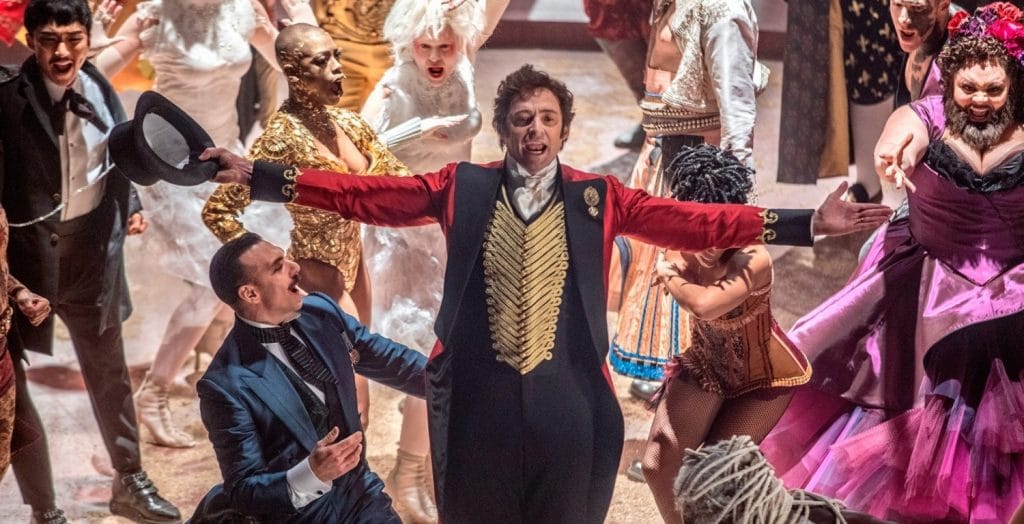Glossing over all the controversies surrounding the real P.T. Barnum, this is an overly sanitized musical with no ambition and made for easy consumption
The Greatest Showman (2017)
Directed by Michael Gracey. Written by Jenny Bicks and Bill Condon. Starring Hugh Jackman, Zac Efron, Michelle Williams, Rebecca Ferguson, Zendaya, Keala Settle, Sam Humphrey and Paul Sparks.
The Greatest Showman is a musical full of attitude but no soul. The attitude can be seen right at the beginning of the film when a vintage 20th Century Fox logo is quickly replaced by a modern one in black and white (go figure) to the sound of an also modern pop beat that seems to exclaim “whoa, scratch that, this is no La La Land; what you’re about to see here is modern stuff.” Then the movie cuts straight to the singing with a glossy overture that follows the Baz Luhrmann guidebook of “how to turn Cinema into a grandiose spectacle” — or at least tries to, since the result is everything but glossy, or classy, or stylish.
What we have here is in fact pretty opaque, as if seen through a dirty piece of glass. Of course, there’s nothing wrong with some cocky pop anachronism — Luhrmann’s dazzling and addictive Moulin Rouge! (2001) is there to prove it — but when you are unable to generate the “wow” factor that a story about entertainment needs, your film doesn’t work, pure and simple. And given how much could have been done about P. T. Barnum and the popularization of “freak shows” in 19th-century America, it’s ridiculous that this looks as unappealing as High School Musical or a lame TV movie, with a tasteless cinematography that doesn’t know how to explore the colors, shapes or a cheap art direction that heavily relies on CGI.
Even worse is how The Greatest Showman is determined to portray Barnum as a good man who only wanted to “make people laugh,” leaving completely aside the fact that he misled people (like with one of his most famous humbugs, the Fiji Mermaid, for example) or even exploited an elderly enslaved African-American woman for exhibition. What the movie shows is a poor boy who grows to become a millionaire with the dream of bringing happiness to his family and everyone else. Sanitized to the point of myopia, this is basically canned Hollywood crap for easy consumption, made by unambitious writers who couldn’t think of anything more complex than corny lines about dreams and “rewriting the stars.”
The plot follows a classic ascension-and-fall arc and couldn’t be lazier. No one cares to explain how Barnum (Hugh Jackman) becomes so rich from one scene to the next. If at first everyone hates him, all it takes, of course, is a song to win their hearts. And the closest thing to character development the movie can think of is Barnum excluding his friends out of prejudice so that we can have an inspirational song nominated for an Oscar. The hypocrisy is outrageous when you see how it tries to “say something important” even though the way Barnum makes a huge profit out of people with physical abnormalities is only called into question because of the shock caused on “normal” people instead of their exploitation.
But still, the biggest “crime” The Greatest Showman commits is with its female characters. Swedish opera singer Jenny Lind (Rebecca Ferguson) — who by the way was a soprano, not a Christina-Aguilera-like pop singer — is reduced to being a vengeful homewrecker who insanely accuses Barnum of using her and constantly whines about whatever. Michelle Williams is also given an ungrateful role, playing the accepting wife who has no personality and only sings about how devoted to her husband she is. Charity Barnum is a muse and nothing else. It is pathetic that a film that wants to offer (some) message about acceptance would be so misogynistic to give in to the most classic (and outdated) female stereotypes.
If only all these problems could at least be saved by decent songs, maybe this wouldn’t be so terrible. But apart from one or two (A Million Dreams is quite nice, actually), the rest is nearly insufferable — although this is compensated by a few good choreographies here and there, like a dance on a rooftop among sheets that “dance” along or another using a trapeze rope. After Barnum becomes a hero by saving someone’s life, convinces a critic that his exploitation of people is a celebration of humanity, and hears one of his “attractions” tell him he “gave them a real family” (forgetting he was a jerk just a few moments before), personal realization falls from the sky with another pasteurized song and joyful dancing. Yeah.
And I won’t even talk about how The Greatest Showman incorrectly suggests that Barnum invented the circus, or the nonsensical moment when Charity says to Barnum that they always took risks together, since he spends the entire movie making plans and decisions without ever consulting her. I guess coherence would be too much to ask from the writers. If this is what a modern musical is supposed to be or look like, then I prefer the old ones, thank you.






I went into this movie with higher expectations than, only because multiple people in my social group loved it, and my daughter’s dance recital was done to the music.however, I was entirely disappointed. I felt no personal connection to any character and that isn’t because I am not a “freak” by modern standards. Each character was just cheaply described and shallow. I did not know the director of Moulin Rouge also directed The Greatest Showman. But the entire time I watched The Greatest Showman, I was thinking “I should be watching Moulin Rouge for the hundredth time, instead of this garbage”.
It is not the same director. Michael Gracey directed this one, not Baz Luhrmann 🙂
O ok. I must have misread your review. Apologies.